Category: SPI
Immigrants were less likely to have received expanded CTC; those who did used it for essentials (Links to an external site)
Laura Brugger and Elaine Maag share their research on the the CTC, specifically comparing immigrant groups to non-immigrant groups on how many receive the payment and how they use it.
Retirement Plans Poised to Benefit From Student Loan Forgiveness (Links to an external site)
The Wall Street Journal shares how money received from the student loan forgiveness program will help people achieve other financial goals.
Apply to become a 2022-2023 Graduate Policy Scholar!
Applications for the Graduate Policy Scholar program are now open to all graduate students at Washington University in St. Louis! The Graduate Policy Scholar program provides students from all fields of study with impactful opportunities and training in policy. Offered by the Social Policy Institute and the Clark-Fox Policy Institute, the yearlong program provides students […]
“Take my word for it”: Group Texts and Testimonials Enhance State and Federal Student Aid Applications

Abstract As the cost of college continues to rise, it has become increasingly important for students to apply for financial aid. However, many students are unaware of the benefits of the Free Application for Federal Student Aid (FAFSA). We launched a field experiment with a non-profit organization to explore how both informational- and testimonial-type text […]
Financial Hardship Increases During Ramadan in Israel
Oren Heller, Postdoctoral Research Associate, and Daniel Yeshua, Program Manager Financial hardship among the Muslim Arab community in Israel increases during Ramadan, a survey from the Social Policy Institute at Washington University in St. Louis finds. This study, the first to examine the economic impact of Ramadan on the Muslim Arab population, can provide insight […]
James F. McDonnell Foundation awards $255k to study student mobility in St. Louis

As a part of the St. Louis Research Practice Collaborative (SRPC) and in partnership with St. Louis University, Jason Jabbari, research assistant professor with the Social Policy Institute at Washington University in St. Louis, has joined a team that received a $255k grant awarded by the James F. McDonnell Foundation for research on student mobility. […]
Experimental Evidence on Consumption, Saving, and Family Formation Responses to Student Debt Forgiveness (Links to an external site)

The Earned Income Tax Credit (EITC) provides substantial financial support to low-income Universal basic income has gained renewed interest among policymakers and researchers in the U.S. While research indicates that unconditional cash transfers produce diverse benefits for households, public support lags in part due to the predicted unemployment and frivolous As policy-makers grapple with whether […]
How Would Americans Respond to Direct Cash Transfers? Results from Two Survey Experiments

The Earned Income Tax Credit (EITC) provides substantial financial support to low-income Universal basic income has gained renewed interest among policymakers and researchers in the U.S. While research indicates that unconditional cash transfers produce diverse benefits for households, public support lags in part due to the predicted unemployment and frivolous spending. To understand how Americans […]
Congratulations to the newly inducted Graduate Policy Scholars from the 2021-2022 cohort!
Congratulations to the fifth cohort of the Graduate Policy Scholars who were inducted as scholars this May. Students represented departments across the university, including Arts & Sciences, Brown School, School of Medicine, School of Law, and the Olin Business School. The students who completed this rigorous program learned and engaged with policy as they developed […]
Disparate financial assistance support for small business owners
Small business owners experienced a drastic economic disruption caused by the COVID-19 pandemic. Government pandemic assistance failed to reach many small business owners, especially those historically underserved by financial institutions. Drawing on a 2021 survey of 246 small business owners, the Social Policy Institute at Washington University in St. Louis descriptively examined the extent to […]
People to Practice to Policy The Social Policy Institute at WashU (May 17) (Links to an external site)

On May 17 we’ll investigate how policy that starts with people and is grounded in evidence can transform the lives of individuals locally, nationally and globally.
Nothing to show for it: Distress among non-degree earners with debt
Press release: May 11, 2022 According to a study by the Social Policy Institute at Washington University in St. Louis, the convergence of college non-completion and student debt among borrowers lead to higher rates of material hardship, healthcare hardship, and financial difficulties than those with a high school degree, those with a college degree, and […]
The financial impacts of a near-miss with natural disasters

By Dan Zhao, postdoctoral research associate, and Michal Grinstein-Weiss, director When disaster strikes, it is easy to neglect the people on the boundaries. When assessing the impact of adverse economic shocks, whether it be natural disasters, pandemics, or factory shutoffs, the focal point is on those who were directly devastated by the shock. However, the […]
Who Protests, What Do They Protest, and Why?

Abstract We examine individuals’ decisions to attend protests during the summer of 2020. Our analysis examines two simultaneous movements: Black Lives Matter along with protests calling for less stringent public health measures to combat the COVID-19 (e.g., for swifter reopening of businesses). Our analysis is made possible by a unique staggered panel data set that […]
Ramadan Just Ended. Its High Economic Price Is Here to Stay (Links to an external site)
In an exclusive with The Marker, the Social Policy Institute investigated the economic impact of Ramadan in Israel.
Disrupted and Disconnected: Child Activities, Social Skills, and Race/Ethnicity During the Pandemic
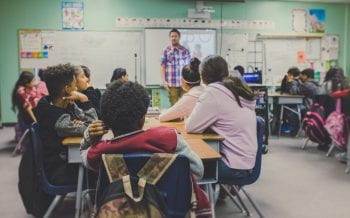
Abstract Early in the COVID-19 pandemic, parents reported that their children spent the majority of their time at home, which can dramatically change their activities and negatively impact their social skills. However, research has yet to uncover the relationships between changes in activities during the pandemic and children’s social skills, nor the degree to which […]
COVID-19 job and income loss and mental health: the mediating roles of financial assets and well-being and the moderating role of race/ethnicity

Abstract Prior research shows unemployment has a negative effect on mental health, yet whether this relationship is affected by financial factors is unknown. For example, having money in savings may mitigate the impact of job loss on mental health. We use structural equation modeling with data from the Socio-Economic Impacts of COVID-19 Survey with a […]
Nothing to show for it: Financial Distress and Re-Enrollment Aspirations for those with non-degreed debt

Abstract The number of individuals with student loan debt who do not earn their degrees is on the rise; nevertheless, there is little research that demonstrates their current circumstances and future aspirations. We address this knowledge gap by comparing the financial distresses and re-enrollment aspirations of student debt-holders who started college but did not earn […]
As the expanded child tax credit draws to a close, yet another study highlights its positive impact (Links to an external site)
The Marketplace interviewed Elaine Maag, senior fellow of the Tax Policy Center and co-author of the Child Tax Credit report by SPI, on the impacts the credit had on the financial security of American families.
The impacts of the 2021 expanded Child Tax Credit on family employment, nutrition, and financial well-being

The 2021 temporary expansion of the child tax credit (CTC) was unprecedented in its reach, lifting 3.7 million children out of poverty as of December 2021. It provided families with up to $3,600 for every child in the household under the age of six and up to $3,000 for every child between the ages of […]
All over the Map: A Systematic Literature Review and State Policy Scan of Medicaid Buy-In Programs for Working Individuals with Disabilities

Abstract While supports for people with disabilities have increased, significant healthcare and financial barriers persist. State-administered Medicaid Buy-In programs for working people with disabilities, distinct from broader buy-in discussions that have emerged as some states consider expanding access to health insurance, are intended to incentivize employment and protect against a loss of Long-Term Services and […]
Expanded Child Tax Credit payments have not reduced employment
Approximately 60 million American children living in 35 million households received monthly payments from the federal government as part of the temporary Child Tax Credit (CTC) expansion. Discourse over whether or not the expanded CTC caused parents to leave the workforce emerged during the period of the expanded credit. On one side, a large number […]
Public perceptions and the willingness to get vaccinated against COVID-19: Lessons from Israel

Abstract Objectives To explore the associations between vaccine hesitancy and demographic and socio-economic characteristics, as well as perspective towards the COVID-19 and its vaccines. Methods Data were collected through four online surveys on Israel’s representative sample in March (3/2 to 3/7, n = 1517), August (8/10–8/11, n = 925; 8/18–8/22, n = 1054), and September (9/22-9/24; n=1406), 2021. We employ a […]
SPI sessions at Association for Public Policy Analysis and Management (APPAM)
Three Social Policy Institute researchers will present their papers and host discussions at the Association for Public Policy Analysis and Management (APPAM) conference on March 28-29, 2022. Below are the papers and discussions presented by the SPI team. 10:15 a.m. (CT) on Monday, March 28, 2022 “Precarious Homeownership and Housing Inequity During the COVID-19 Pandemic” […]
Introducing new associate directors
Friends of SPI, I am delighted to announce three new Social Policy Institute associate directors! SPI has grown significantly since its launch in 2019 and our new associate directors will ensure we continue to generate important evidence and policy-passionate leaders needed to inform equitable policies and inclusive communities. I hope you will join me in […]
We Are All Data People: An Equity-Centered Approach to Increasing Impact
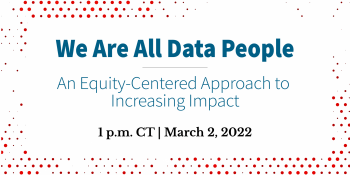
The launch of a series of free learning opportunities for increasing social sector impact, capacity and connection around data. About this event Social sector organizations can increase their impact and advance their missions by cultivating effective, ethical, and equitable data practices. Based on St. Louis social sector input, the Data for Social Impact initiative is […]
The Impact of Tax Refund Delays on the Experience of Hardship Among Lower-Income Households

Abstract The Earned Income Tax Credit (EITC) provides substantial financial support to low-income workers in the USA, yet around a quarter of EITC payments are estimated to be erroneous or fraudulent. Beginning in 2017, the Protecting Americans from Tax Hikes Act of 2015 requires the Internal Revenue Service to spend additional time processing early EITC […]
The Precarity of Self-Employment among Low- and Moderate-Income Households

Abstract Many people in the United States have achieved economic stability through self-employment and are often seen as embracing the entrepreneurial spirit and seizing opportunity. Yet, research also suggests that self-employment may be precarious for many people in the lower socioeconomic strata. Drawing on a unique dataset that combines longitudinal survey data with administrative tax […]
Introduction: The COVID-19 Shock to Our Deep Inequities: How to Mitigate the Impact

The COVID-19 pandemic affected nearly every aspect of household health, as well as the social and economic well-being of individuals and communities across the United States. Many in our society have faced and continue to face unprecedented challenges. Specifically, the pandemic put a microscope on inequities such as racial disparities in housing, health care, and […]
Crashing without a Parachute: Racial and Educational Disparities in Unemployment during COVID-19

Abstract The burden of the COVID-19 pandemic has not been shouldered equally by American families. Black and Hispanic communities have been hit the hardest, with the pandemic often exacerbating existing disparities. Using nationally representative data, we assess the economic and public health effects of the pandemic among different socioeconomic groups and whether typical sources of […]
Inclusive Growth in St. Louis Events
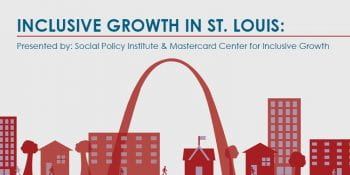
Who benefits from economic growth in St. Louis? Despite promises of job creation, increasing home values, new businesses, and representative leadership in St. Louis, the benefits of economic growth have not been equally, nor equitably, distributed. As the economy rebuilds itself from COVID-19 devastation, now is the time to consider how St. Louis can become […]
What’s Happening With The Child Tax Credit (Links to an external site)

Forbes interviewed Dr. Leah Hamilton, SPI faculty affiliate, about the additional benefits of the CTC due to its lack of work requirement conditions for parents.
Policy & Practice Strategies for Inclusive Growth in St. Louis

A 6-part event series, Inclusive Growth in St. Louis investigated who is left out of St. Louis’ economic growth benefits, the policies that have led to the unequal distribution of opportunities, and actionable recommendations to become a more inclusive economy. This report summarizes those discussions and recommendations.
Apprenticeships increase employment, earnings, and optimism in the technology sector (Links to an external site)

Given the novel and rapidly changing nature of the labor market, learning new skills quickly will become an increasingly important aspect of workforce development and social mobility. The Social Policy Institute investigates LaunchCode, a St. Louis boot camp with an apprenticeship model, as a viable option to increase wealth-building opportunities and upskill a more diverse labor […]
New Year greetings from the director
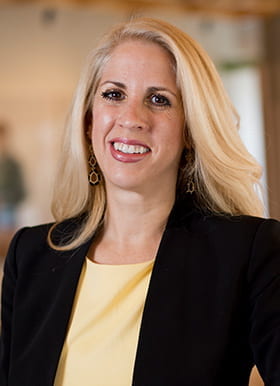
Thank you for being a valued member of the Social Policy Institute community this past year. I am extremely proud of our team—staff, faculty affiliates, funders and community partners—who work so hard to make the world more equitable for everyone. Our mission to make the world more equitable by applying innovative, evidence-based solutions to complex social problems […]
Beyond the Buzzwords: What is “Data for Social Impact,” and why does it matter?
Social sector organizations can increase impact, both individually and collectively, by being more strategic in how they engage with data. There is no one-size-fits-all approach, but rather a range of processes and practices for individuals and organizations to consider as they grapple with complex challenges in their communities.
Activating Inclusive Growth in St. Louis

On Dec. 9, 2021, we learned how to influence policy and collaborate with like-minded people to activate change in our last Inclusive Growth in St. Louis event. After a year of events investigating why economic growth in St. Louis benefits some groups of people more than others and how we can change systems to support […]
Immigrant Parents Are Less Aware of Child Tax Credit Than US-Born Parents and More Likely to Plan to Use It to Invest in Education, Fill Gaps in Child Care and Health Care (Links to an external site)
The Tax Policy Center recently shared research from Laura Brugger, data analyst II of SPI, and Elaine Maag, principal research associate at the Urban Institute, on how immigrant families have accessed and used the Child Tax Credit.
Pandemic isolation increasing negative behaviors among children in Israel
Isolation as a result of COVID-19 exposure is a key public health protocol to mitigate the spread of the virus; however, new survey results indicate increased isolations are associated with anger, violence, difficulties sleeping, and prolonged screen time.
15 Actionable Strategies to Embrace Inclusive Leadership
Speakers at the Inclusive Growth in St. Louis event series on Sept. 23 identified 15 strategies to proactively support and amplify diverse voices and perspectives as discussed by the speakers at the event.
Employment, Financial and Well-being Effects of the 2021 Expanded Child Tax Credit: Wave 1 Executive Summary
The 2021 temporary expansion of the Child Tax Credit (CTC) is unprecedented in its reach and is predicted to cut American child poverty by more than half. The expanded CTC provides families with $3,600 for every child in the household under the age of six and $3,000 for every child between the ages of six […]
Apply to become a Graduate Policy Scholar!
Applications for the Graduate Policy Scholar program are now open to all graduate students at Washington University in St. Louis! The Graduate Policy Scholar program provides students from all fields of study with impactful opportunities and training in policy. Offered by the Social Policy Institute and the Clark-Fox Policy Institute, the yearlong program provides students […]
New longitudinal Socioeconomic Impacts of COVID-19 Survey calls for sustained public benefit support
The Social Policy Institute at Washington University in St. Louis (SPI) released new findings on the impact of COVID-19 on housing hardship, the importance of employment and associated benefits, such as the Payment Protection Program, family hardships, and efficiency of public benefits designed to support households in need, such as SNAP, TANF, and unemployment insurance benefits.
Embracing Inclusive Leadership
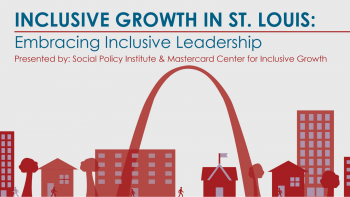
Join us at 12:30 p.m. CT on Thursday, Sept. 23 for an event discussing strategies to create inclusive leadership.
‘A manic moment’ for renters as Supreme Court ends eviction moratorium (Links to an external site)
Yung Chun, data analyst III at SPI, discussed the implications of the end of the eviction moratorium and the impact on renters with a reporter from the Sinclair Broadcast Group.
Policy & practice: How to build long-term financial wellness
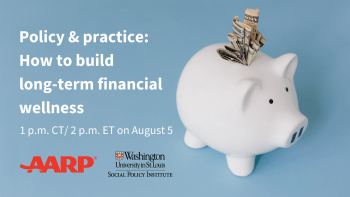
We know that liquid assets provide a safety net for short-term financial well-being, but how can we transition from short-term financial stability to longer-term financial health? Researchers, Jeremy Burke, Stephen Roll and Emily Gallagher shared their findings on the mitigation effect of liquid assets during a financial shock, the leading factors that contribute to long-term […]
Only half of Israelis want a third COVID-19 vaccine shot – survey
Internationally collaborative seed grant recipients: Where are they now?
Over the last two years, the Social Policy Institute and McDonnell International Scholars Academy at Washington University in St. Louis have partnered in sponsoring internationally collaborative research. The first projects, funded at the beginning of 2020, explored social policy globally to understand systemic challenges within and between nations. However, as with everything in 2020, the […]
Why are Israeli parents of 12-15-year-olds hesitant to vaccinate their children?
By Yaniv Shlomo, Senior Fellow; Oren Heller, Postdoctoral Research Associate; Daniel Yeshua, Program Manager; and Michal Grinstein-Weiss, Director Download a PDF to read this text in Hebrew: מדוע הורים לבני 12 עד 15 מהססים לחסן את ילדיהם? While most Israeli adults are vaccinated, 62% of parents are hesitant to vaccinate their 12-15-year-old children. The findings […]